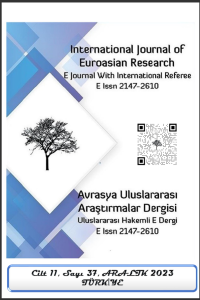Abstract
Technology has been a significant driver of sociological change throughout history. The relationship between technology and society is complex, with technology both shaping and being shaped by social forces. Technological developments, which started with the industrial revolution and gained a new dimension with Industry 4.0, have brought about radical changes in the ways technology is used to offer new products and services (Petrasch and Hentschke 2016). In addition, the 2020 Covid-19 pandemic has accelerated digital transformation causing many services and activities to be transferred to the digital environment and education was no exception. Advances in technology, changes in social structure and unforeseen epidemics and natural disasters have brought learning management systems in the center of our lives as a main part of education services. Although there existed several learning management systems for a while, after the 2020 pandemic we started to see a rapid increase in such systems. However, usability of these systems need to be evaluated preferably before and after their release. In this paper, we examined the usability of Bozok Learning Management System (BOYSIS) developed within Yozgat Bozok University and designed in line with the needs of the university. Since every system performs differently depending on the social and cultural environment it belongs, system usability needs to be evaluated from the point of final users. For this purpose, the System Usability Scale (SUS) was employed and we found that the BOYSIS has acceptable level of usability, yet it is below the expected industry standard.
Keywords
Usability evaluation system usability scale learning management system SUS Bozok Learning Management System
References
- Albertos Marco, Félix, Victor Penichet, and Jose A. Gallud. 2013. “Collaborative E-Learning through Drag & Share in Synchronous Shared Workspaces.” Journal of Universal Computer Science 19:894–911.
- Alhadreti, Obead. 2020. “Assessing Academics’ Perceptions of Blackboard Usability Using SUS and CSUQ: A Case Study during the COVID-19 Pandemic.” International Journal of Human–Computer Interaction 37(11):1003–15. doi: 10.1080/10447318.2020.1861766.
- Bangor, Aaron, Philip T. Kortum, and James T. Miller. 2008. “An Empirical Evaluation of the System Usability Scale.” International Journal of Human–Computer Interaction 24(6):574–94. doi: 10.1080/10447310802205776.
- Binyamin, Sami, Malcolm Rutter, and Sally Smith. 2016. “THE UTILIZATION OF SYSTEM USABILITY SCALE IN LEARNING MANAGEMENT SYSTEMS: A CASE STUDY OF JEDDAH COMMUNITY COLLEGE.” Pp. 5314–23 in. Seville, Spain.
- Bozok University. 2023. “YOZGAT BOZOK UNIVERSITY IN 2020 IN NUMBERS”. Accessed December 2. 2023. https://bozok.edu.tr/haber/bas%C4%B1n%20toplant%C4%B1s%C4%B1/2188#:~:text=Rekt%C3%B6r%C3%BCm%C3%BCz%20Prof.-,Dr.,2%20bin%2096%20personelimiz%20bulunmaktad%C4%B1r.
- Braun, Virginia, and Victoria Clarke. 2006. “Using Thematic Analysis in Psychology.” Qualitative Research in Psychology 3:77–101. doi: 10.1191/1478088706qp063oa.
- Brooke, John. 1996. “SUS -- a Quick and Dirty Usability Scale.” Pp. 189–94 in.
- Brooke, John. 2013. “SUS: A Retrospective.” Journal of Usability Studies 8:29–40.
Abstract
References
- Albertos Marco, Félix, Victor Penichet, and Jose A. Gallud. 2013. “Collaborative E-Learning through Drag & Share in Synchronous Shared Workspaces.” Journal of Universal Computer Science 19:894–911.
- Alhadreti, Obead. 2020. “Assessing Academics’ Perceptions of Blackboard Usability Using SUS and CSUQ: A Case Study during the COVID-19 Pandemic.” International Journal of Human–Computer Interaction 37(11):1003–15. doi: 10.1080/10447318.2020.1861766.
- Bangor, Aaron, Philip T. Kortum, and James T. Miller. 2008. “An Empirical Evaluation of the System Usability Scale.” International Journal of Human–Computer Interaction 24(6):574–94. doi: 10.1080/10447310802205776.
- Binyamin, Sami, Malcolm Rutter, and Sally Smith. 2016. “THE UTILIZATION OF SYSTEM USABILITY SCALE IN LEARNING MANAGEMENT SYSTEMS: A CASE STUDY OF JEDDAH COMMUNITY COLLEGE.” Pp. 5314–23 in. Seville, Spain.
- Bozok University. 2023. “YOZGAT BOZOK UNIVERSITY IN 2020 IN NUMBERS”. Accessed December 2. 2023. https://bozok.edu.tr/haber/bas%C4%B1n%20toplant%C4%B1s%C4%B1/2188#:~:text=Rekt%C3%B6r%C3%BCm%C3%BCz%20Prof.-,Dr.,2%20bin%2096%20personelimiz%20bulunmaktad%C4%B1r.
- Braun, Virginia, and Victoria Clarke. 2006. “Using Thematic Analysis in Psychology.” Qualitative Research in Psychology 3:77–101. doi: 10.1191/1478088706qp063oa.
- Brooke, John. 1996. “SUS -- a Quick and Dirty Usability Scale.” Pp. 189–94 in.
- Brooke, John. 2013. “SUS: A Retrospective.” Journal of Usability Studies 8:29–40.
Details
| Primary Language | English |
|---|---|
| Subjects | Sociology and Social Studies of Science and Technology |
| Journal Section | Articles |
| Authors | |
| Early Pub Date | December 8, 2023 |
| Publication Date | December 15, 2023 |
| Submission Date | November 2, 2023 |
| Acceptance Date | November 25, 2023 |
| Published in Issue | Year 2023 Volume: 11 Issue: 37 |
Avrasyad''de yayınlanan makaleler, Creative Commons Atıf-Gayriticari 4.0 Uluslararası Lisansı (CC BY-NC 4.0) ile lisanslanmıştır. Bilimsel araştırmaları kamuya ücretsiz sunmanın bilginin küresel paylaşımını artıracağı ilkesini benimseyen dergi, tüm içeriğine anında açık erişim sağlamaktadır. Makalelerdeki fikir ve görüşlerin sorumluluğu sadece yazarlarına ait olup Avrasyad''nin görüşlerini yansıtmazlar. Kullanım Şartları ve Gizlilik Politikası


